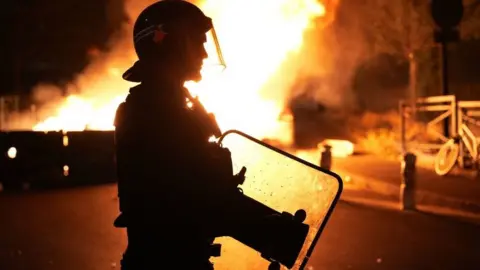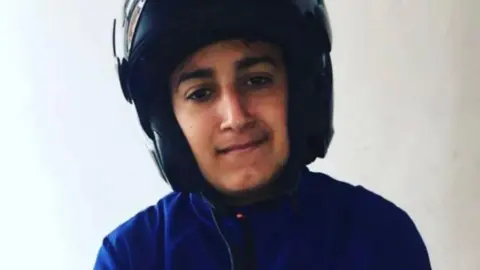France riots: Fuelled by everyday discrimination
 Getty Images
Getty ImagesIn our series of letters from African journalists, France-based Maher Mezahi writes how racism and Islamophobia lie behind the anger seen on the country's streets over the past week.

The riots which spread countrywide after the killing by police of Nahel M, a 17-year-old boy of Algerian origin, have shaken French society to its very core. The unrest has been described as unprecedented in terms of scale and intensity.
In Marseille, a city that I've called home over the past year, an absurd routine settled into place.
Afternoons were for rushing to finish errands before shops and public transport prematurely shut down ahead of the impending chaos.
Evenings were characterised by a high-stakes game of cat-and-mouse between police and rioters, set to the pulsating soundtrack of car sirens, helicopters and fireworks.
Mornings were for French talk-shows and the one-sided analysis they often platformed.
The same carousel of police union spokespersons, law analysts and politicians repeatedly attempted to explain the who, what, and - most notably - why the riots were taking place.
While there was almost unanimous condemnation of the police killing of Nahel, after the riots many were quick to raise the same-old question regarding immigration into France.
There was the ever-present: "How have third- and fourth-generation French citizens of immigrant descent failed to integrate into French society?"
And my personal favourite: "Don't rioters understand that they are ruining their own property?"
That such questions have yet to be answered decades after they were first raised makes me question whether those asking them were sincerely searching for answers.
 Supplied
SuppliedIn his famed commencement speech at Kenyon College in the US in 2005, late American novelist David Foster Wallace put forth the parable of two young fish swimming past an older fish, who says to them: "Morning, boys. How's the water?"
The two continue on their way and then one asks the other: "What the hell is water?"
"The point of the fish story is merely that the most obvious, important realities are often the ones that are hardest to see and talk about," Wallace noted.
As a young, Algerian, Muslim man who grew up in Canada, my observation of day-to-day life in France over the past few months is that the water reeks of latent, banalised racism and Islamophobia.
In the weeks leading up to the shooting, there were several examples of major media outlets and political elites making highly provocative statements about Muslims and Algerians in France.
At the start of June, former Prime Minister Edouard Philippe gave a wide-ranging interview in which he called for immigration reform. He said that some French people don't consider second- or third-generation immigrants French for purposes of "integration, education, civic-mindedness" - and that these views should be heard.
Mr Philippe went on to say that another problem many French people have with immigration is Islam.
"It is a central subject, a disturbing subject, a haunting subject," he said.
Finally, he advocated revoking a bilateral treaty that makes it easier for Algerians to immigrate to France.
Later on in June, France's most watched news channel, BFM TV, filmed the entrance of a middle school in Lyon so that they could count how many students walked in with an "abaya", a loose robe worn by many Muslim women.
The report was meant to tell the French public that the open display of religion was creeping into schools, contravening the doctrine of laïcité - the French concept of strict secularism in the public space.
The girls defiantly walked up to the entrance in their abayas and removed their headscarves, or hijabs, as French law requires, forcing the institution to acknowledge that it was actively undressing them.
The scenes were reminiscent of Frantz Fanon's Algeria Unveiled essay, in which he analyses the colonial apparatus' obsessive gaze on Algerian women who covered their bodies.

The abaya controversy was followed by the story that a handful of Muslim children in Nice, between the ages of nine and 11, had the audacity to pray in their school courtyard.
The mayor of Nice, Christian Estrosi, the head of a right-wing political party, Eric Ciotti, and the Minister of Education, Pap Ndiaye, all publicly lambasted the children.
A few days later, and just a few weeks ahead of the 2023 Fifa Women's World Cup, a French court upheld a ban on Muslim footballers wearing the hijab.
While the officer who killed Nahel is in custody, right-wing personalities created a crowdfunding campaign for him, which received €1.6m (£1.4m; $1.7m) in donations before it was closed.
Some left-leaning politicians condemned the campaign, but others on the right used it to symbolise their support for the police and it has become a highly divisive issue.
All of this fuels the feeling of many Muslims and North Africans living in France that they are not accepted by the state and society, and explains why many people reacted with such anger to the killing of Nahel.
Martin Luther King Jr once said that "a riot is the language of the unheard".
Last week, and perhaps for the very first time in their lives, troubled French youth made themselves heard.

More Letters from Africa:

Follow us on Twitter @BBCAfrica, on Facebook at BBC Africa or on Instagram at bbcafrica


